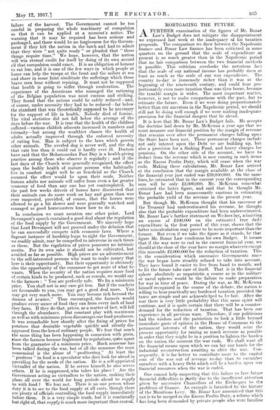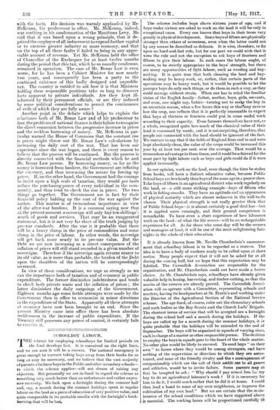MORTGAGING THE FUTURE.
AFURTHER examination of the figures of Mr. Boner Law's Budget does not mitigate the disappointment we expressed last week at the inadequacy of his taxation proposals. The comparison we drew between the Napoleonic finance and Bonar Law finance has been criticized in some quarters on the ground that the scale of expenditure at present is so much greater than in the Napoleonic period that no fair comparison between the two financial med.:oda is possible. This criticism overlooks the notorious fact that the scale of our national income has probably risen at least as much as the scale of our war expenditure. The country to-day is immensely richer than it was at the beginning of the nineteenth century, and could bear pro- portionately even more taxation than was then borne, because the taxable margin is wider. The most important matter, however, is not to make comparisons with the past, but to estimate the future. Even if we were doing proportionately better than our ancestors in the Napoleonic period, we should still not be doing well enough if we were making inadequate provision for the financial dangers that lie ahead.
It is here that Mr. Boner Law's Budget fails. He accepts the doctrine laid down by Mr. McKenna a year ago that we must measure our financial position by the margin of revenue that remains over after the permanent charges falling upon the State have been met. Those permanent charges include not only interest upon the Debt we are building up, but also a provision for a Sinking Fund, and heavy charges for pensions. On the other side of the account, we have to deduct from the revenue which is now coming in such items as the Excess Profits Duty, which will cease when the war ends. Making these calculations, Mr. Bonar Law arrived at the conclusion that the margin available at the close of the financial year just ended was £59,000,000. On the same lines, he estimated that in the current year the corresponding BUM will be only £2,000,000. Mr. McKenna somewhat criticized the latter figure, and said that he thought Mr. Boner Law had been unnecessarily cautious in estimating the probable yield of the revenue in the present year.
But though Mr. McKenna thought that his successor at the Treasury had underestimated his revenue, he thought also that the probable expenditure had been underestimated. Mr. Boner Law's further statement on Wednesday, admitting an excess of £100,000 on the estimated true daily expenditure in the first period of this year, shows that the latter miscalculation may prove to be more important than the former. But even if we take the figure as it stands, by that figure Mr. Boner Law condemns his own Budget. It means that if the war were to end in the current financial year, we should at the close of the year have no margin whatever except this miserable £2,000,000 for the reduction of taxation. Thii is the consideration which successive Governments since the war began have steadily refused to take into account. They have found it easier to live from hand to mouth, and to let the future take care of itself. That is in the financial sphere absolutely as unpatriotic a course as in the military or naval spheres would be the failure to make preparation for war in time of peace. During the war, as Mr. McKenna himself recognized in the course of the debate, the nation is willing to bear practically any burden of taxation provided the taxes are simple and are acknowledged to be fair. After the war there is very little probability that this same spirit will continue, and it is quite certain that there will be a counter- demand for the reduction of taxation. That has been our experience in all previous wars. Therefore, if our politicians had the wisdom and the patriotism to look a little beyond immediate gusts of opinion in the House of Commons to the permanent interests of the nation, they would seize the present opportunity for raising as much revenue as possible in order that they might be in a position to lighten the burden on the nation the moment the war ends. We shall want alt the financial means upon which we can lay our hands for the industrial reconstruction awaiting us after the war. Con- sequently, it is far better to contribute more to the capital cost of the war out of revenue to-day than to encumber ourselves with a heavy Debt which will be a burden upon our financial resources when the war is ended.
One cannot help suspecting that this failure to face future financial difficulties is rhutl y due to the insufficient attention given by successive Chancellors of the Exchequer to the problems of finance. An example is furnished by the history of the Munitions Levy. Mr. Boner Law announced that this tax is to be merged in the Excess Profits Duty, a reform which has long been demanded by private people who were familiar with the facts. His decision was warmly applauded by Mr. McKenna, his predecessor in office. Mr. McKenna, indeed, was scathing in his condemnation of the Munitions Levy. He said that it was based upon a wrong principle, that it de- prived the employer of all inducement to expend further capital or to exercise greater industry or more economy, and that on the top of all these faults it failed to bring in any appre- ciable amount of revenue. Yet Mr. McKenna held the office of Chancellor of the Exchequer for at least twelve months during the period that this tax, which he so roundly condemns, remained in operation. The case of Mr. Bonar Law is even worse, for he has been a Cabinet Minister for now nearly two years, and consequently has been a party to the continued existence of this badly designed and unprolifie tax. The country is entitled to ask how it is that Ministers holding these responsible positions take so long to discover facts apparent to private individuals. Are they kept ill- informed by their permanent officials, or are they induced by some political considerations to permit the continuance of evils of which they are fully aware ?
Another point in the debate which helps to explain the reluctance both of Mr. Sonar Law and of his predecessor to face the problems of national finance is their failure to recognize the direct connexion between the progressive increase in prices and the reckless borrowing of money. Mr. McKenna in par- ticular warned the House of Commons that the constant rise is prices might throw out Mr. Bonar Law's calculations by increasing the daily cost of the war. That has been our experience since the war began, and there is every reason to believe that the process will be continued. But the process is directly connected with the financial methods which he and Mr. Bonar Law pursue. By borrowing money, so far as the money is borrowed from bankers, the Government are inflating the currency, and thus increasing the means for forcing up prices. If, on the other hand, the Government had the courage to insist upon a high scale of taxation, they would pro tanto reduce the purchasing-power of every individual in the com- munity, and thus tend to check the rise in prices. The two things go together. The Government are in fact by their financial policy bidding up the cost of the war against the nation. This matter is of tremendous importance in view of the after-war burdens. It is a common saying now that at the present moment a sovereign will only buy ten-shillings'- worth of goods and services. That may be an exaggerated statement, but it is not very far short of the truth judging by pre-war standards. After the war it is probable that there will be a heavy slump in the price of commodities and some slump in the price of labour. In other words, the sovereign will get back more nearly to its pre-war value. But the Debt we are now increasing as a direct consequence of the inflation of prices will still stand recorded in a given number of sovereigns. Therefore if the sovereign again returns nearer to its old value, as is more than probable, the burden of the Debt upon the shoulders of the nation will be correspondingly increased.
In view of these considerations, we urge as strongly as we can the importance both of taxation and of economy in public expenditure. The former diminishes indebtedness and tends to check both private waste and the inflation of prices ; the latter diminishes the daily outgoings of the Government. Eighteen months ago some feeble attempts were made by the Government .then in office to economize in minor directions in the expenditure of the State. Apparently all these attempts at economy have now been brought to an end. Since the present Ministry came into office there has been absolute recklessness in the increase of public expenditure. If the Treasury still possesses any power of control, it certainly fails to exercise it.



























 Previous page
Previous page